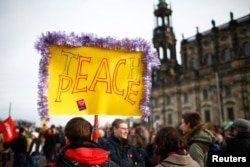Germany's anti-Islamic organization Pegida held rallies in several European cities Saturday to protest against mass immigration and what it calls the “Islamization” of Europe.
Several thousand supporters of Pegida, which is the German acronym for Patriotic Europeans Against the Islamization of the Occident, demonstrated in Dresden, Germany, the movement's birthplace.
Riot police clashed with demonstrators in Amsterdam, where about 200 Pegida supporters held their first protest in the Dutch capital. The riot police, who outnumbered both the Pegida supporters and those protesting against it, intervened to separate the opposing sides and detained several people from both groups.
In Birmingham, Pegida held its first official march in Britain, although it involved fewer than 200 participants. Its coordinator, Tommy Robinson, said that the last year’s influx of 1½ million immigrants should not be repeated.
"The more Islam, the less freedom. That is the reality," he said. "I don't believe that we should be bringing in last year 1½ million young, fighting age, Muslim men into Germany. Six hundred thousand of them have gone missing, 150,000 from Sweden. We don't know who they are, what their motives are in Europe. We have already seen 130 people killed by so-called refugees in France. We have a big problem."
Some Pegida supporters, like Bill Weir, expressed concerns about the inability of a number of Muslims to integrate in Western societies.
"We’ve got a really, truly multicultural society and we all benefit from it, but it's being distorted by one particular ideology, who will not under any circumstances integrate with us," Weir said. "That's the truth, people don't like it and because of that I get called a racist, a fascist, a Nazi. I'm neither of those things."
Other demonstrations for and against immigration took place Saturday in the Czech Republic cities of Prague and Brno; Warsaw, Poland; Bratislava, Slovakia; the French cities of Calais and Montpellier; and Graz in southern Austria.
The Czech Republic, Slovakia, Hungary and Poland have taken a tough stance on migration and opposed European Union calls to take in significant numbers of refugees.
Pegida began in mid-2014 and has since spread to other countries, as Europe struggles to cope with its worst refugee crisis since World War II. The refugees, most fleeing war-torn Syria, sought asylum in the EU counties in 2015, almost three-quarters of them in Germany.








